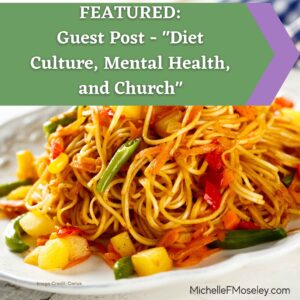One of the things I value about working in the mental health field is connecting with other providers. Making connections and getting to know other mental health professionals allows me to make the best referrals to meet folks’ needs, as well as to have a sounding board and place to share resources.
Travis Jeffords, M.Div, MS, LCMHCA, NCC is one of the NC-area providers I’ve gotten to know in recent months. He and I both work with religious trauma, but come from different backgrounds and have had some wonderful conversations about how we each can best serve clients and the community at-large.

Travis recently invited me to write a guest post for his blog that focuses on some of my specialized work with religious trauma and body image concerns. Check out the excerpts below for a glimpse of what I shared:
“The term “diet culture” describes the belief that appearance and body size are of utmost importance, and includes the lengths that folks may go to in order to fit within cultural expectations of beauty or health. Aspects of diet culture include, but are not limited to: comments about bodies and weight, criticism of others’ food choices, labeling food as “good/healthy” or “bad/junk”, fad diets and encouragement to eliminate food groups to change your body size, focus on moving one’s body solely as a form of changing its shape, and lack of accessible seating for individuals in larger bodies.
Diet culture impacts all aspects of health. Physical health can be damaged by repeated efforts to lose weight that rely on restricting foods or overexerting oneself in exercise. Mental health can be impacted by the comments of others and the internal judgments one may have about oneself. Even spiritual health can be influenced if an individual feels unworthy due to their negative body image.”
Read The Full Post
The full post examines in more detail the ways that diet culture can impact various aspects of our health. I also provide some ideas for those who are in leadership positions within a church or faith community to help support the overall health of their participants. Head on over to Diet Culture, Mental Health, & Church to read the full post.
If you’re in the Triad area of NC (Winston-Salem, High Point, Greensboro) and looking for a therapist, you can learn more about Travis and his current work here.
Michelle F. Moseley is a Licensed Mental Health Counselor in NC and a Registered Telehealth Provider in FL. She believes ALL people deserve respect, compassion, and access to mental and physical healthcare. Michelle specializes in working with survivors of religious trauma and with those who have body image concerns, finding there is frequent overlap in these areas. You can learn more about Michelle by visiting her website at MichelleFMoseley.com or following her on Instagram – @therapy_with_michelle
